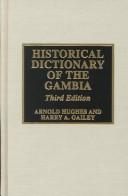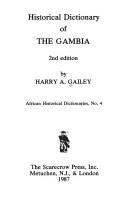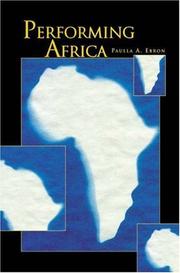| Listing 1 - 10 of 19 | << page >> |
Sort by
|

ISBN: 0810836602 Year: 1999 Volume: 79 Publisher: Lanham ; London Scarecrow Press
Abstract | Keywords | Export | Availability | Bookmark
 Loading...
Loading...Choose an application
- Reference Manager
- EndNote
- RefWorks (Direct export to RefWorks)
908 <665.1> --- Heemkunde. Area studies--Gambia --- Gambia --- Gambie --- Colony of the Gambia --- Republic of the Gambia --- Respublika Gambii︠a︡ --- Gambii︠a︡ --- Gambia, The --- The Gambia --- ガンビア --- Ganbia --- History --- Dictionaries --- 冈比亚 --- Gangbiya

ISBN: 0810820013 9780810820012 Year: 1987 Volume: 4 Publisher: Metuchen Scarecrow
Abstract | Keywords | Export | Availability | Bookmark
 Loading...
Loading...Choose an application
- Reference Manager
- EndNote
- RefWorks (Direct export to RefWorks)
Gambia --- History --- Dictionaries --- Gambie --- Colony of the Gambia --- Republic of the Gambia --- Respublika Gambii︠a︡ --- Gambii︠a︡ --- Gambia, The --- The Gambia --- ガンビア --- Ganbia --- 冈比亚 --- Gangbiya --- Dictionaries. --- Gambia - History - Dictionaries
Book
ISBN: 1462334288 1452759561 1280883995 1451880804 9786613725301 Year: 2006 Publisher: Washington, D.C. : International Monetary Fund,
Abstract | Keywords | Export | Availability | Bookmark
 Loading...
Loading...Choose an application
- Reference Manager
- EndNote
- RefWorks (Direct export to RefWorks)
In recent years, the IMF has released a growing number of reports and other documents covering economic and financial developments and trends in member countries. Each report, prepared by a staff team after discussions with government officials, is published at the option of the member country.
Gambia --- Colony of the Gambia --- Gambia, The --- Gambie --- Gambii︠a︡ --- Ganbia --- Gangbiya --- Republic of the Gambia --- Respublika Gambii︠a︡ --- The Gambia --- ガンビア --- 冈比亚 --- Economic conditions --- Economic policy. --- Money and Monetary Policy --- International Economics --- Monetary Policy --- International Agreements and Observance --- International Organizations --- Monetary economics --- International institutions --- Monetary policy --- International organization --- International agencies

ISBN: 0691074895 0691074887 9786612158544 1282158546 1400825210 9781400825219 9780691074887 9780691074894 Year: 2009 Publisher: Princeton, NJ
Abstract | Keywords | Export | Availability | Bookmark
 Loading...
Loading...Choose an application
- Reference Manager
- EndNote
- RefWorks (Direct export to RefWorks)
The jali--a member of a hereditary group of Mandinka professional performers--is a charismatic but contradictory figure. He is at once the repository of his people's history, the voice of contemporary political authority, the inspiration for African American dreams of an African homeland, and the chief entertainment for the burgeoning transnational tourist industry. Numerous journalists, scholars, politicians, and culture aficionados have tried to pin him down. This book shows how the jali's talents at performance make him a genius at representation--the ideal figure to tell us about the "Africa" that the world imagines, which is always a thing of illusion, magic, and contradiction. Africa often enters the global imagination through news accounts of ethnic war, famine, and despotic political regimes. Those interested in countering such dystopic images--be they cultural nationalists in the African diaspora or connoisseurs of "global culture"--often found their representations of an emancipatory Africa on an enthusiasm for West African popular culture and performance arts. Based on extensive field research in The Gambia and focusing on the figure of the jali, Performing Africa interrogates these representations together with their cultural and political implications. It explores how Africa is produced, circulated, and consumed through performance and how encounters through performance create the place of Africa in the world. Innovative and discerning, Performing Africa is a provocative contribution to debates over cultural nationalism and the construction of identity and history in Africa and elsewhere.
Folklore --- Griots --- Mandingo (African people) --- Music --- Performance --- History and criticism. --- Gambia --- Social life and customs. --- Folk beliefs --- Folk-lore --- Traditions --- Art music --- Art music, Western --- Classical music --- Musical compositions --- Musical works --- Serious music --- Western art music --- Western music (Western countries) --- Malinke (African people) --- Mandé (African people) --- Manding (African people) --- Mandingue (African people) --- Mandinka (African people) --- Mandino (African people) --- Maninka (African people) --- Maninkaalu (African people) --- Soce (African people) --- Sosse (African people) --- Gambie --- Colony of the Gambia --- Republic of the Gambia --- Respublika Gambii︠a︡ --- Gambii︠a︡ --- Gambia, The --- The Gambia --- Ethnology --- Manners and customs --- Material culture --- Mythology --- Oral tradition --- Storytelling --- Historians --- Storytellers --- ガンビア --- Ganbia --- History and criticism --- 冈比亚 --- Gangbiya
Book
ISBN: 1462338321 1451988834 1280978783 9786613750396 1452789193 Year: 2008 Publisher: Washington, D.C. : International Monetary Fund,
Abstract | Keywords | Export | Availability | Bookmark
 Loading...
Loading...Choose an application
- Reference Manager
- EndNote
- RefWorks (Direct export to RefWorks)
The Gambian authorities produced two Annual Progress Reports (APRs) covering implementation of the first Poverty Reduction Strategy Paper (PRSP) during 2002–03 and 2004, respectively. This addendum is organized around four of the main themes of the first PRSP: (i) macroeconomic stability and effective public resource management; (ii) promotion of pro-poor growth and employment creation through private sector development, particularly in the rural agricultural sector; (iii) improved basic social services and infrastructure; and (iv) capacity-building of local communities and civil society organizations (CSOs).
Poverty --- Destitution --- Wealth --- Basic needs --- Begging --- Poor --- Subsistence economy --- Gambia --- Colony of the Gambia --- Gambia, The --- Gambie --- Gambii︠a︡ --- Ganbia --- Gangbiya --- Republic of the Gambia --- Respublika Gambii︠a︡ --- The Gambia --- ガンビア --- 冈比亚 --- Economic conditions. --- Economic policy. --- Public Finance --- Civics and Citizenship --- Social Services and Welfare --- Health: General --- Education: General --- Formal and Informal Sectors --- Shadow Economy --- Institutional Arrangements --- Government Policy --- Provision and Effects of Welfare Program --- National Government Expenditures and Related Policies: General --- Health economics --- Education --- Civil service & public sector --- Social welfare & social services --- Public finance & taxation --- Health --- Civil society organizations --- Poverty reduction strategy --- Expenditure --- Economic sectors --- Civil society --- Expenditures, Public
Book
ISBN: 146233024X 1452796890 1280884517 1451880847 9786613725820 Year: 2006 Publisher: Washington, D.C. : International Monetary Fund,
Abstract | Keywords | Export | Availability | Bookmark
 Loading...
Loading...Choose an application
- Reference Manager
- EndNote
- RefWorks (Direct export to RefWorks)
This paper focuses on the Staff-Monitored Program (SMP) for The Gambia. Understandings have been reached with the authorities on the SMP covering the period October 1, 2005 to March 31, 2006. Key objectives of the program include making progress toward fiscal sustainability, strengthening internal controls and the operational independence of the Central Bank of The Gambia, and enhancing public financial management and accountability. Successful implementation of the SMP should pave the way for reaching understandings on a possible new arrangement under the Poverty Reduction and Growth Facility (PRGF).
International Monetary Fund --- Internationaal monetair fonds --- International monetary fund --- Gambia --- Colony of the Gambia --- Gambia, The --- Gambie --- Gambii︠a︡ --- Ganbia --- Gangbiya --- Republic of the Gambia --- Respublika Gambii︠a︡ --- The Gambia --- ガンビア --- 冈比亚 --- Economic conditions --- Economic policy. --- Budgeting --- Money and Monetary Policy --- Public Finance --- National Government Expenditures and Related Policies: General --- Monetary Policy, Central Banking, and the Supply of Money and Credit: General --- National Government Expenditures and Related Policies: Infrastructures --- Other Public Investment and Capital Stock --- National Budget --- Budget Systems --- Public finance & taxation --- Monetary economics --- Budgeting & financial management --- Expenditure --- Monetary base --- Capital spending --- Public financial management (PFM) --- Budget planning and preparation --- Money --- Expenditures, Public --- Money supply --- Capital investments --- Finance, Public --- Budget
Book
ISBN: 146237767X 1451986815 1280898429 1452713510 9786613739735 Year: 2008 Publisher: Washington, D.C. : International Monetary Fund,
Abstract | Keywords | Export | Availability | Bookmark
 Loading...
Loading...Choose an application
- Reference Manager
- EndNote
- RefWorks (Direct export to RefWorks)
An assessment is provided of The Gambia’s performance in meeting the requirements for reaching the completion point under the Enhanced Heavily Indebted Poor Countries (HIPC) Initiative is provided. Next, the paper reviews the status of creditor participation and presents an updated debt sustainability analysis (DSA). The paper contains a summary of the main conclusions, and lists a number of issues for discussion by the Boards of IDA and the IMF. The poverty database and monitoring capacity has been improved. Macroeconomic performance under the third poverty reduction growth facility (PRGF)-supported program has been strong.
Debt relief --- Poverty --- Destitution --- Wealth --- Basic needs --- Begging --- Poor --- Subsistence economy --- Debt renegotiation --- Debt rescheduling --- Debt restructuring --- Relief, Debt --- Renegotiation, Debt --- Rescheduling, Debt --- Restructuring, Debt --- Debtor and creditor --- Law and legislation --- Gambia --- Colony of the Gambia --- Gambia, The --- Gambie --- Gambii︠a︡ --- Ganbia --- Gangbiya --- Republic of the Gambia --- Respublika Gambii︠a︡ --- The Gambia --- ガンビア --- 冈比亚 --- Economic policy. --- Exports and Imports --- Financial Risk Management --- Public Finance --- International Lending and Debt Problems --- Debt --- Debt Management --- Sovereign Debt --- National Government Expenditures and Related Policies: General --- International economics --- Finance --- Public finance & taxation --- Debt service --- External debt --- Debt sustainability --- Expenditure --- Asset and liability management --- Debts, External --- Expenditures, Public
Book
ISBN: 1455252115 1452773831 1280896299 9786613737601 1452719578 Year: 2007 Publisher: Washington, D.C. : International Monetary Fund,
Abstract | Keywords | Export | Availability | Bookmark
 Loading...
Loading...Choose an application
- Reference Manager
- EndNote
- RefWorks (Direct export to RefWorks)
This Joint Staff Advisory Note discusses the Poverty Reduction Strategy Paper (PRSP) for The Gambia. The Gambian authorities have prepared their second PRSP covering the years 2007 to 2011. The PRSP supports greater decentralization and expansion of social development funds to better target public services for the poor. Given that there has been limited progress in implementing the Local Government Act in 2002, the IMF staff recommends the preparation of a country-owned implementation plan and a sensitization program that would create momentum.
Poverty --- Finance, Public --- Cameralistics --- Public finance --- Public finances --- Currency question --- Destitution --- Wealth --- Basic needs --- Begging --- Poor --- Subsistence economy --- Gambia --- Colony of the Gambia --- Gambia, The --- Gambie --- Gambii︠a︡ --- Ganbia --- Gangbiya --- Republic of the Gambia --- Respublika Gambii︠a︡ --- The Gambia --- ガンビア --- 冈比亚 --- Economic conditions. --- Economic policy. --- Appropriations and expenditures. --- Labor --- Macroeconomics --- Public Finance --- Environmental Economics --- National Government Expenditures and Related Policies: General --- Education: General --- Public Enterprises --- Public-Private Enterprises --- Employment --- Unemployment --- Wages --- Intergenerational Income Distribution --- Aggregate Human Capital --- Aggregate Labor Productivity --- Environmental Economics: General --- Public finance & taxation --- Civil service & public sector --- Education --- Environmental economics --- Public financial management (PFM) --- Expenditure --- Public sector --- Civil service reform --- Economic sectors --- Environment --- Expenditures, Public --- Civil service --- Environmental sciences
Book
ISBN: 1462381707 1452753504 1280886897 1451880839 9786613728203 Year: 2006 Publisher: Washington, D.C. : International Monetary Fund,
Abstract | Keywords | Export | Availability | Bookmark
 Loading...
Loading...Choose an application
- Reference Manager
- EndNote
- RefWorks (Direct export to RefWorks)
This Joint Staff Advisory Note reviews the first Annual Progress Report (APR) of The Gambia’s Poverty Reduction Strategy Paper (PRSP). The APR indicates that The Gambia’s progress in implementing the PRSP has been uneven. Slow implementation mainly reflected low capacity, a lack of commitment, and poor prioritization of policies implemented in 2002–03. Among the five basic components, the authorities made the most progress in increasing access to basic social services. By contrast, they did not achieve most macroeconomic targets for 2002 and 2003.
Poverty --- Finance, Public --- Cameralistics --- Public finance --- Public finances --- Currency question --- Destitution --- Wealth --- Basic needs --- Begging --- Poor --- Subsistence economy --- International Monetary Fund --- Internationaal monetair fonds --- International monetary fund --- Gambia --- Colony of the Gambia --- Gambia, The --- Gambie --- Gambii︠a︡ --- Ganbia --- Gangbiya --- Republic of the Gambia --- Respublika Gambii︠a︡ --- The Gambia --- ガンビア --- 冈比亚 --- Appropriations and expenditures. --- Economic conditions --- Public Finance --- Agribusiness --- Social Services and Welfare --- Government Policy --- Provision and Effects of Welfare Program --- Education: General --- Agriculture: General --- National Government Expenditures and Related Policies: General --- Social welfare & social services --- Education --- Agricultural economics --- Public finance & taxation --- Poverty reduction strategy --- Poverty reduction --- Agricultural sector --- Expenditure --- Economic sectors --- Agricultural industries --- Expenditures, Public
Book
ISBN: 1455291463 1452722374 1280980710 1452797269 9786613752321 Year: 2006 Publisher: Washington, D.C. : International Monetary Fund,
Abstract | Keywords | Export | Availability | Bookmark
 Loading...
Loading...Choose an application
- Reference Manager
- EndNote
- RefWorks (Direct export to RefWorks)
A number of initiatives begun in the Poverty Reduction Strategy Paper (PRSP) remain incomplete and need to be further implemented in the new PRSP. Executive Directors recommend institutionalization of the PRSP process as a comprehensive approach to overall public policymaking. Strengthened governance is a fundamental cornerstone of the PRSP process. The Gambia has to sustain ongoing efforts, especially in strengthening public expenditure management, the investment climate, and internal controls at the central bank. It will be critical for the PRSP process to be open, transparent, and participatory.
Poverty --- Destitution --- Wealth --- Basic needs --- Begging --- Poor --- Subsistence economy --- Gambia --- Colony of the Gambia --- Gambia, The --- Gambie --- Gambii︠a︡ --- Ganbia --- Gangbiya --- Republic of the Gambia --- Respublika Gambii︠a︡ --- The Gambia --- ガンビア --- 冈比亚 --- Economic conditions. --- Economic policy. --- Public Finance --- Environmental Economics --- Social Services and Welfare --- Government Policy --- Provision and Effects of Welfare Program --- Education: General --- National Government Expenditures and Related Policies: General --- Environmental Economics: General --- Social welfare & social services --- Education --- Public finance & taxation --- Environmental economics --- Poverty reduction --- Expenditure --- Environment --- Poverty reduction strategy --- Expenditures, Public --- Environmental sciences
| Listing 1 - 10 of 19 | << page >> |
Sort by
|

 Search
Search Feedback
Feedback About UniCat
About UniCat  Help
Help News
News